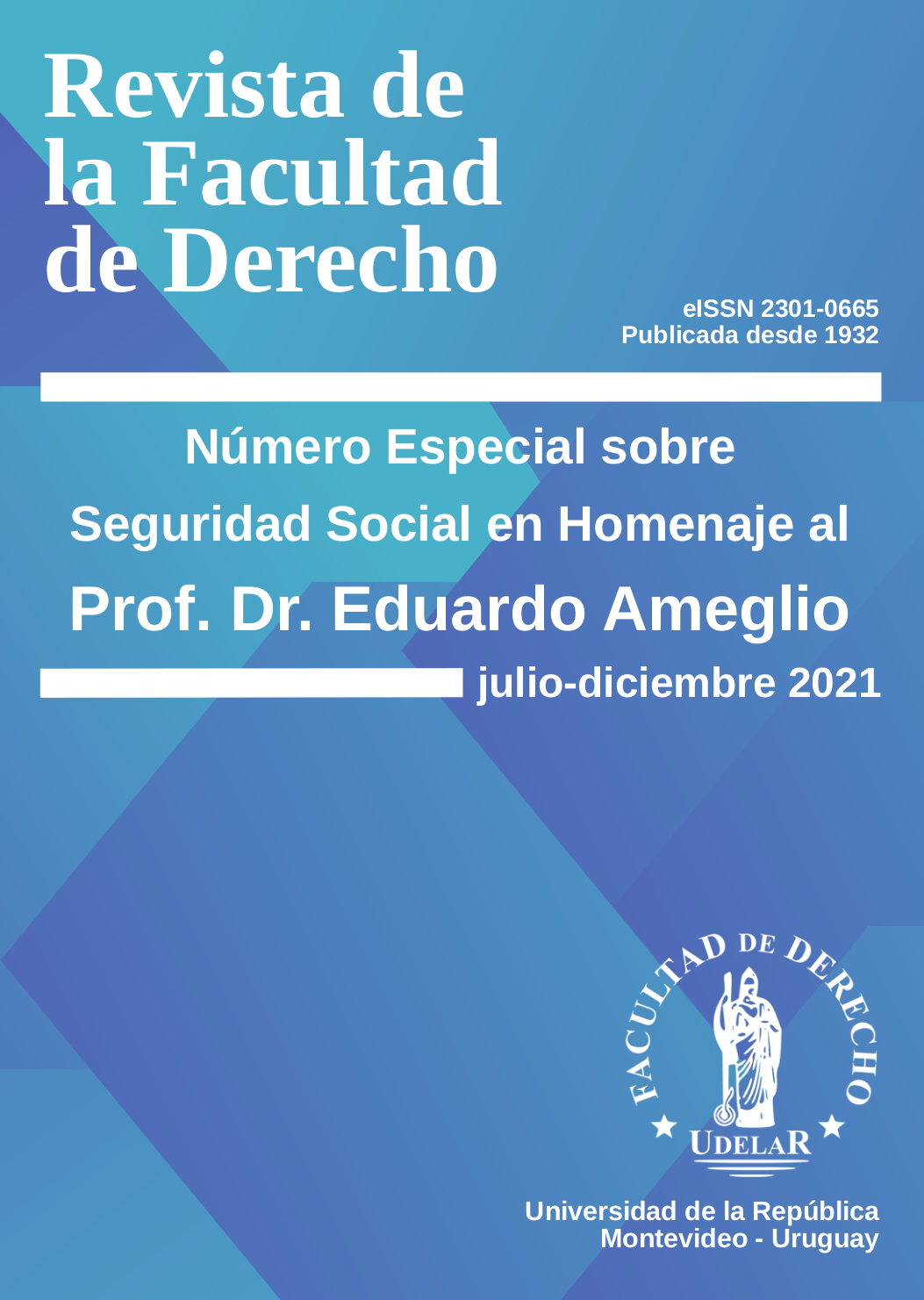Reform Of The Pension Regime: The Need For A Powerful Zero Pillar
DOI:
https://doi.org/10.22187/e2021n52espa5Keywords:
Zero pillar, Social Protection, Social Security, Welfare State, Pension reform, Non-contributory benefits.Abstract
Within the framework of the pension reform process that the country has begun, the creation of a universal, zero pillar, financed by taxes, is proposed. The mentioned one would provide fair and sufficient care to old age, without affecting the rights stated by the international regulations ratified by our country.
The country's experience in the matter of non-contributory old-age benefits is highlighted, as well as the financing of contributory benefits which has largely relied on fiscal resources, since worker-employer contributions are not enough, emphasizing that this is, ultimately, an option of the constituent.
In terms of coverage and sufficiency of the contributory system, the short and medium-term prospects are observed with concern, due to the very probable downward trend, which is why it is understood that it is necessary to advance in the implementation of a universal zero pillar that compensates for the noted trend.
The Swedish experience is reviewed and the importance of building a state policy on Social Security matters is highlighted, this state policy must attract the highest level of possible consensus, to ensure stability and predictability in the medium and long term.
Finally, the confluence of prestigious doctrine, as well as international organizations around the need to develop universal protection instruments in old age, as would be the case of zero pillar.
Downloads
References
Baldwin, P. (1992). La política de solidaridad social. Bases sociales del Estado de Bienestar europeo 1875-1975. MTSS de España.
Barbagelata, H. (2009). El particularismo del Derecho del Trabajo y los Derechos Humanos Laborales. (2da. Ed.)Montevideo: FCU.
Caporale, F., Zunino, G. (2021). Desigualdades intra-generacionales en el Sistema de Seguridad Social en Uruguay. Montevideo: Observatorio de Seguridad Social de CINVE.
Cecchini, Simone (compilador). (2019). Protección social universal en América Latina y el Caribe.Cepal. Recuperado de https://www.cepal.org/es/publicaciones/44995-proteccion-social-universal-america-latina-caribe-textos-seleccionados-2006-2019
CESS. (2020). Diagnóstico del Sistema Previsional Uruguayo. Informe de la Comisión de Expertos en Seguridad Social.Recuperado de https://cess.gub.uy/es/documentos
CEPAL. (2006). La protección social de cara al futuro: acceso, financiamiento y solidaridad. Recuperado de: https://www.cepal.org/es/publicaciones/2806-la-proteccion-social-cara-al-futuro-acceso-financiamiento-solidaridad
Fernández, A. (2021). Equilibrio individual del sistema de reparto de BPS. CESS. Nota técnica n° 8. Recuperado de:.https://www.bps.gub.uy/bps/file/18403/1/79.-equilibrio-individual-del-sistema-de-reaprto-del-bps.-cr.-alex-fernandez.pdf
Fernández, A. (2021). Equilibrio individual del sistema de reparto de BPS. CESS. (Nota técnica n° 8).
Ferrajoli, L. (2008). Democracia y garantismo. Madrid. Ed. Trotta.
Mangarelli, C. (2021). Eduardo J. Ameglio (1952-2021). Derecho laboral. Vol. 64, no. 281 (enero-marzo 2021),
Mangarelli, C. (2008). La cobertura universal del sistema de protección y seguridad social y la empleabilidad. Revista Derecho Laboral 51 (230).
Pérez del Castillo, S., Rodríguez Azcúe, Á. (2020). Derecho de la seguridad social Montevideo: FCU
Raso Delgue, J. (1990). La financiación de la seguridad social. En Plá Rodríguez, A. y otros. La seguridad social en el Uruguay. 2da. ed., . Montevideo: FCU.
Rodríguez Azcúe, Á. (2006). Evolución histórica del sistema jubilatorio. En Temas jubilatorios. Montevideo: Facultad de Derecho.
Rodríguez Azcúe, Á. Economía colaborativa: cobertura de la seguridad social. En G. Gauthier (Coordinador). (2016). Disrupción, economía compartida y Derecho. Enfoque jurídico multidisciplinario. Montevideo. FCU.
Rodríguez Azcúe, Á. (2018). El brazo no contributivo de la seguridad social. Revista Derecho Laboral, 61 (271)
Rodríguez Azcúe, Á. (2019 ) Los tres mundos del Estado del bienestar y sus retos en la concepción de Gosta Esping-Andersen. Revista Derecho Laboral 62 (275).
De León, L., Pizzo, N. (2019). Trabajo a través de plataformas digitales. Análisis del fenómeno en Uruguay. Montevideo: FCU
Hernández Álvarez, O. (2021). Fraude laboral en la era digital. Revista Derecho Laboral ( 63)
Saldain, R. (2020). La era de los nuevos viejos.: longevidad, trabajo y jubilación en el siglo XXI. Montevideo: R. Saldain
Schwrzer, H., Casalí, P., Bertranou, F. (Coord.). (2014). La Estrategia de Desarrollo de los Sistemas de Seguridad Social de la OIT. El Papel de los Pisos de Protección Social en América Latina y el Caribe.OIT Recuperado de https://www.ilo.org/americas/publicaciones/WCMS_317898/lang--es/index.htm
Published
How to Cite
Issue
Section
License
This journal provides open access to its content, based on the principle that providing the public with free access to research helps a greater global exchange of knowledge
Revista de la Facultad de Derecho. Creative Commons Reconocimiento 4.0 Internacional License.


